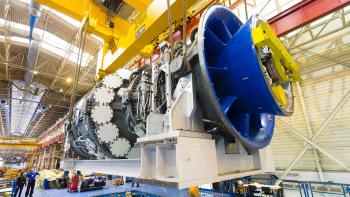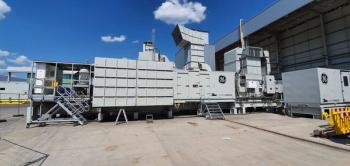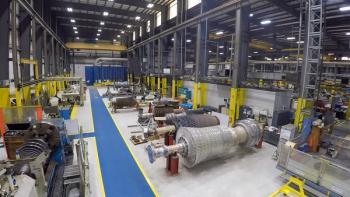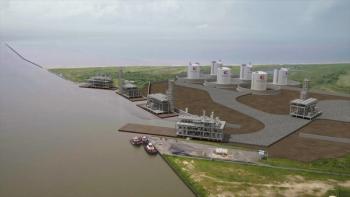
MHI Thermal Systems Launches ETI-N Centrifugal Chiller with Magnetic Bearing Tech
Key Takeaways
- The ETI-N chiller's magnetic bearing technology eliminates lubrication needs, enhancing efficiency and reducing maintenance requirements.
- ETI-N models range from 150-700 refrigeration tons, using HFO-1233zd refrigerant to minimize environmental impact.
The magnetic bearing technology reinforces an oil-free design, eliminating the need for a lubrication oil system and preventing wear on sliding parts.
Mitsubishi Heavy Industries Thermal Systems (MHI Thermal Systems) unveiled its newly developed
Without these lubrication systems, the ETI-N removes the necessity for periodic oil replacement activities and, as a result, the unit significantly minimizes maintenance work. Unlike conventional centrifugal chillers, the ETI-N does not require an oil pump or the time to formulate the lubricating oil film. With these quick-start features, the chiller improves operational efficiency for customers.
MHI Thermal Systems’ ETI-N series is available in small- to medium-capacity models ranging from 150 – 700 refrigeration tons, featuring a standard built-in inverter to reduce transportation and installation work. Its high efficiency is reinforced by a 6.4 coefficient of performance and a 9.1 integrated part-load value. The refrigerant, HFO-1233zd, is a non-flammable, non-ozone-depleting solution with a global warming potential of 1 to reduce environmental impact.
Adding the ETI-N magnetic bearing centrifugal chiller enriches the current product portfolio, offering customers a broader range of technologies for their specific applications. MHI Thermal Systems’ portfolio combines greener environmental performance with improved equipment performance, including the:
- ETI-Z series launched in 2015 using HFO-1233zd
- GART-ZE/ZEI series introduced in 2017 with HFO-1234ze
- JHT-Y/YI series released in 2022 using HFO-1234yf
ETI-W Centrifugal Heat Pump
In early October 2025, MHI Thermal Systems launched the newly developed
The pump’s coefficient of performance is 4.01 when supplying hot water temperature of 90 ℃, and it’s capable of handling large-scale industrial capacities equivalent to a 1-ton boiler with 640-kW capacity. It is equipped with centrifugal compressors—also utilized on MHI’s centrifugal chillers—that are designed for refrigerant characteristics and high compression ratios.
The technology achieves high performance and a small footprint by using an inverter starter panel within the primary unit and a shell-and-tube heat exchanger. On the environmental side, it uses a non-fluorocarbon refrigerant—HFO-1233zd(E)—with a global warming potential of 1 and does not deplete the ozone layer.
MHI’s EC-8
Also, MHI Thermal Systems launched an updated version of its Ene-Conductor Heat Source Control System. The new
The EC-8 model supports both the individual pump system and the multiple pump system widely used in large-scale facilities built across Southeast Asia and the Middle East. It uses the BACnet protocol and Modbus to enable real-time communication and information exchange between machines and sensors, improving response time. The system contains fewer signal cables, simplifying construction management.
Newsletter
Power your knowledge with the latest in turbine technology, engineering advances, and energy solutions—subscribe to Turbomachinery International today.




